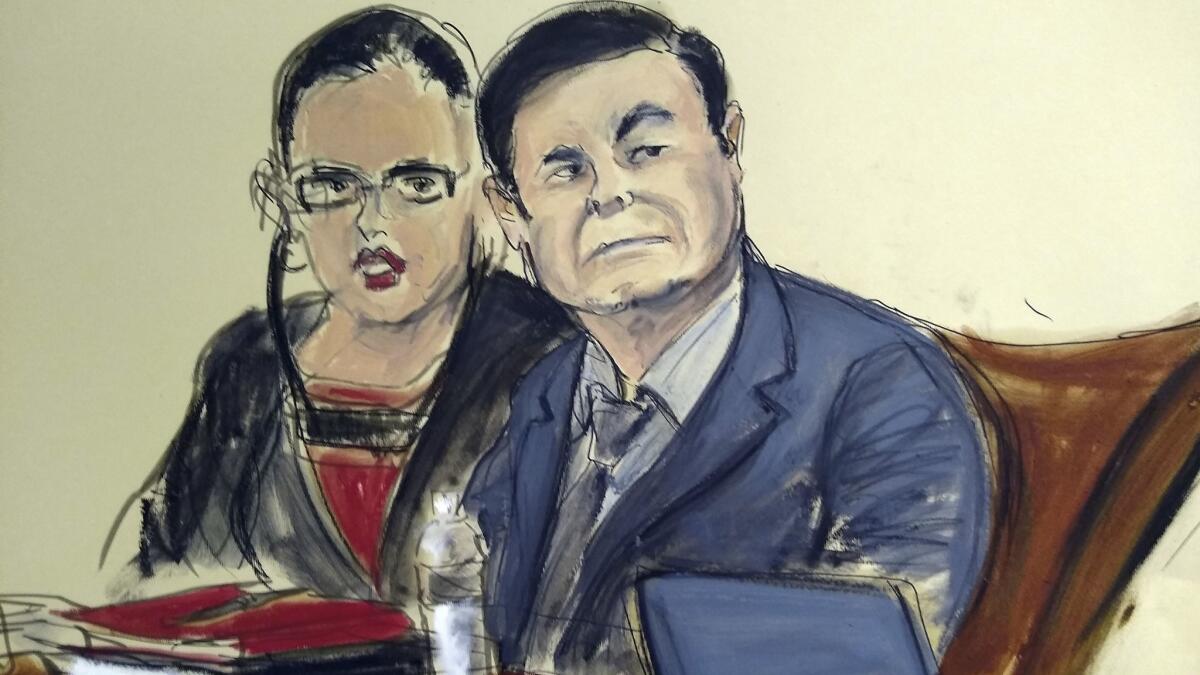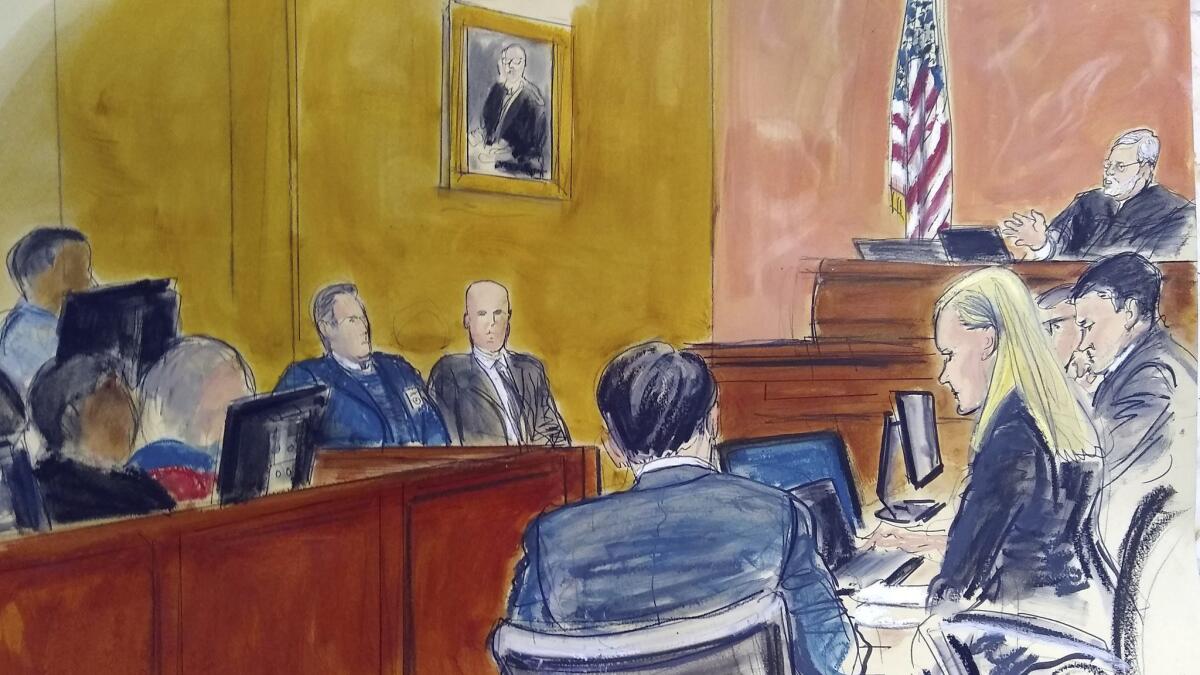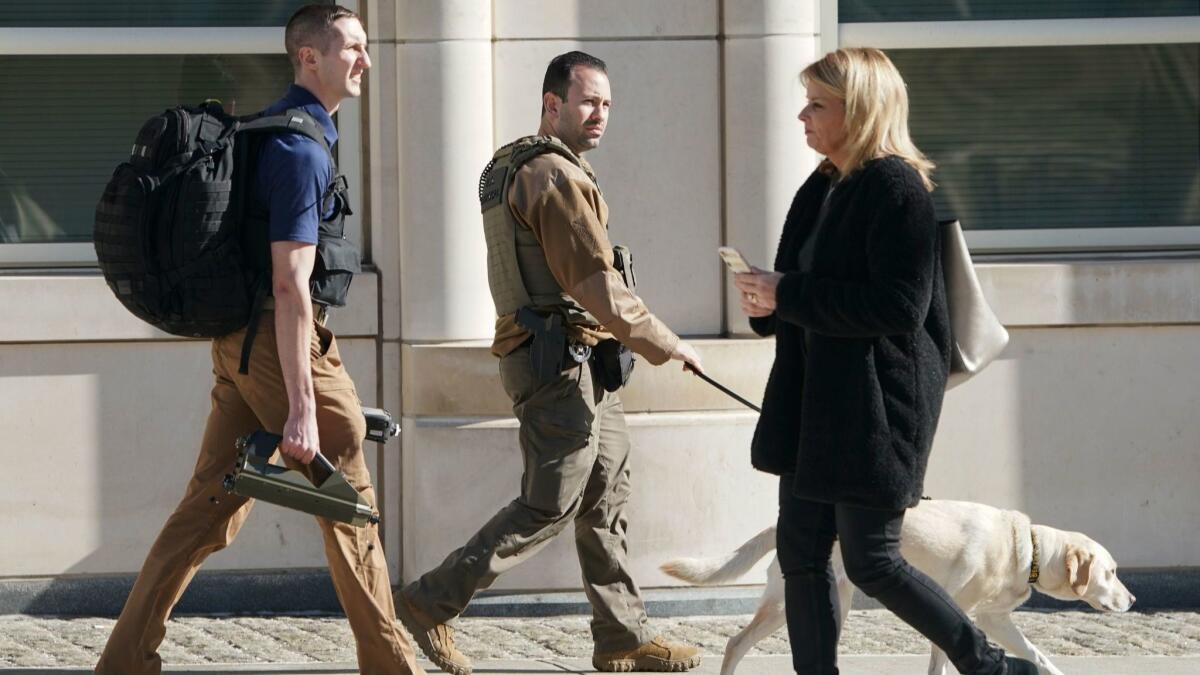‘El Chapo’ trial jurors can finally talk about the case — to each other, as deliberations begin

- Share via
Reporting from New York — Maybe it’s the description of Joaquin “El Chapo” Guzman running through an escape tunnel naked, fleeing from capture, leaving his terrified mistress trailing behind him in the murky darkness.
Perhaps it’s the testimony about pickled-jalapeño cans filled with more than $1 billion worth of cocaine, loaded into 18-wheeler trucks and smuggled into Los Angeles from Tijuana over three years.
Or it could be more horrific testimony, about a badly beaten rival cartel member held until his rotting wounds began to reek, and an angry Guzman shooting him and ordering him buried, even though the man was still gasping for breath.
Whatever outlandish details might linger with the seven women and five men who have sat in a jury box across from one of the world’s most notorious drug traffickers through a monumental 12-week trial, they’re now free, for the first time, to discuss them. With each other, at least.
The jury began deliberating shortly after 1 p.m. Monday in federal court in Brooklyn. The judge had spent the morning giving jurors instructions on the charges they would be deliberating.

Right after jurors left the courtroom, acting U.S. Atty. Gen. Matthew Whitaker came to court to shake prosecutors’ hands and wish them luck with the case.
American authorities have been working on a case against Guzman, a leader of the multibillion-dollar Sinaloa cartel, for nearly a decade.
He was captured in Mexico in 2016 and extradited to the United States the following year. He faces 10 counts of drug trafficking, conspiracy to murder, and firearms violations, and if convicted he could spend the rest of his life in prison.
By 2 p.m., the jury had four questions for the judge in quick succession: In one, they asked whether a “drug war is considered part of a drug trafficking crime as related to count nine,” a weapons charge. It was perhaps no surprise that they had questions. The counts against Guzman are certainly complicated. The first count, engaging in a continuing criminal enterprise, for example, has 27 separate violations to consider.
Speaking to the lawyers without the jury present, U.S. District Judge Brian Cogan wondered aloud if jurors were getting ahead of themselves, or “putting the cart before the horse,” as he put it.
When he called the jury back into court to answer questions, Cogan reminded jurors that they should only be debating count nine if they had already found Guzman guilty of at least one of the first four counts of the indictment. If you don’t find Guzman guilty of counts one, two, three or four, he said “you never get to count nine.”
The other requests were simple to oblige: Jurors wanted extra copies of the charges, requested all the exhibits submitted as evidence, and wondered if ephedrine should be considered a methamphetamine.
Guzman is charged with making and distributing meth, which can be made from ephedrine. The judge’s answer on that: They’d have to determine that for themselves, based on the evidence.
Prosecutors had called more than 50 witnesses and portrayed Guzman as a ruthless killer who used cunning, violence and corruption to build an international crime organization.

Guzman is such a feared drug lord that the jurors, who remain anonymous, are carted back and forth to court each day under the protection of the U.S. Marshals Service, and the courthouse is under unprecedented security.
In her closing arguments, prosecutor Andrea Goldbarg reminded the jurors of Guzman’s multiple escapes, including twice from prison: “He’s sitting right there. Do not let him escape responsibility. Hold him accountable for his crimes. Find him guilty on all counts.”
The defense has aimed to portray Guzman as the victim of a corrupt system, a broke scapegoat hunted because of his fame, while the real leader of the Sinaloa cartel remains free because he helped frame Guzman.
A few minutes after 4 p.m., the jury had one last note for the judge: They wanted to go home for the day.
Trial days generally have ended about 4:30 p.m. for jurors, but now they’re free to deliberate late into the evening — something the judge wanted to emphasize before he let them go.
“For future reference,” Cogan told them, “you can stay as long as you like.”
Jurors are expected back in court at 9:30 a.m. to continue deliberations.
Plagianos is a special correspondent.
More to Read
Sign up for Essential California
The most important California stories and recommendations in your inbox every morning.
You may occasionally receive promotional content from the Los Angeles Times.










